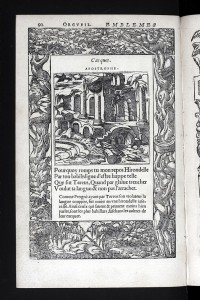In Andrea Alciato’s famous, influential, and much-translated book of Emblems, can be found this surprising and somewhat troubling appropriation of the Procne and Philomela story.
This is the French translation by Barthélemy Aneau published by Guillaume Rouille and Macé Bonhomme, Lyon, 1549 (the emblem was first published in Latin in 1546):
Pourquoy romps tu mon repos Hirondelle
Par ton babil? digne d’estre huppe telle
Que fut Tereus, Quand par glaive trencher
Voulut ta langue: & non pas l’arracher.Comme Progné ayant par Tereus son violateur la langue couppée, fut muée en une hirondelle jase-resse. Ainsi ceulx qui savent & peuvent moins bien parler, sont les plus babillars, faschans les aultres de leur cacquet.
Why do you disturb my rest, Swallow,
With your babble? Worthy of being a hoopoe
Was Tereus, when with his blade
He sought to sever your tongue: and not to tear it out by the roots.
As Procne, whose tongue was cut out by Tereus her violator, was transformed into a jangling Swallow, so those who know least and talk badly, are the loudest babblers, upsetting others with their cackle.
The emblem shows a solitary bird flying into a ruin, possibly depicting the babbler’s destruction of all civil relationships and communication with her excessive noise. What is odd about the verse and its explanatory gloss is that it almost entirely ignores the violence and abuse in the original Greek myth. In Ovid’s retelling of the story in Metamorphoses, Procne and Philomela were sisters; Procne was married to Tereus, who raped his sister-in-law Philomela, and cut out her tongue so she could not denounce him to her sister. When Philomela managed to tell her story by weaving it into a tapestry she sent to Procne, the two sisters took their revenge by killing Itys, Philomela and Tereus’s son, and serving him up as a meal to his father. Mad with grief, Tereus went after the sisters with a sword but was turned into a hoopoe, while Procne and Philomela became birds: Ovid is not specific, but usually Procne becomes a swallow and Philomela a nightingale. (In the emblem, the names of the sisters are reversed.)
In Alciato’s emblem, this story of rape and extreme vengeance becomes a cry of irritation against a babbler. ‘Procne’ is no longer the victim of horrific violence and the perpetrator of infanticide, but an ignorant woman who doesn’t know when to shut up and so deserves to have her tongue ripped out. The transformation of Tereus from mutilating rapist into a man driven to distraction by a woman’s incessant talk is, to say the least, odd: the horror of the story feels entirely excessive to the point it is used to make. This appropriation of the story as a moralising tale and a warning to babblers, particularly women, suggests that the stereotype of the scolding, gossiping, talkative wife was undercut with an understanding of the relationship between the sexes as one fundamentally based on violence and antagonism. But the remnants of the Greek myth – the parts of the story that aren’t told – are so much in excess of the moral of the emblem that I am left feeling confused and a little disorientated.

